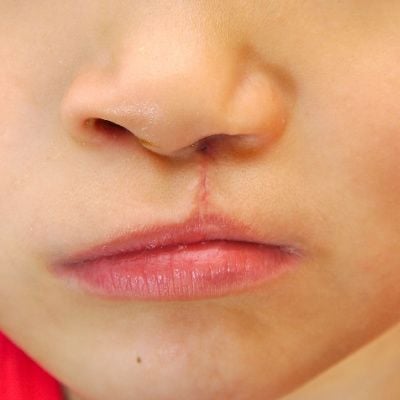 Cleft palate/cleft lip are the most common types of birth defects. About one baby in 2,000 is born with a cleft palate, and one in 1,000 is born with a cleft lip. Cleft palate/cleft lips occur when the two sides of either the roof of the mouth (palate) or the lips fail to fuse in the embryo. The cause of this birth defect is unknown. The incidence of cleft palate alone is about 30% of these defects; cleft lip alone is about 20%, and cleft palate and cleft lip have about 50% of these defects.
Cleft palate/cleft lip are the most common types of birth defects. About one baby in 2,000 is born with a cleft palate, and one in 1,000 is born with a cleft lip. Cleft palate/cleft lips occur when the two sides of either the roof of the mouth (palate) or the lips fail to fuse in the embryo. The cause of this birth defect is unknown. The incidence of cleft palate alone is about 30% of these defects; cleft lip alone is about 20%, and cleft palate and cleft lip have about 50% of these defects.
Cleft Palate
A cleft palate is a congenital condition that affects the palate's structure, often requiring early intervention and a comprehensive treatment approach. With timely medical care and ongoing support, individuals with cleft palate can lead healthy, fulfilling lives and overcome the conditions' associated challenges.
Types of Cleft Palate:
A cleft palate can manifest in different ways, and its severity varies. The primary types include:
- Incomplete Cleft Palate (Soft Palate Cleft): In this form, a cleft or gap occurs in the soft tissue at the back of the mouth, known as the soft palate. This may or may not extend into the hard palate.
- Complete Cleft Palate (Hard and Soft Palate Cleft): This type involves a cleft that affects both the soft palate and the hard palate, creating a more extensive gap.
- Submucous Cleft Palate: In this less common type, the cleft is covered by a thin layer of oral lining mucosa, making it less visible.
Cleft Lip
A cleft lip is a congenital condition that affects the upper lip, often requiring early intervention and a comprehensive treatment approach. With timely medical care and ongoing support, individuals with cleft lip can lead healthy, fulfilling lives and overcome the challenges associated with the condition.
Symptoms and Complications:
Cleft lip can lead to various symptoms and potential complications, including:
- Feeding difficulties, such as the gap in the lip, can affect the baby's ability to form a proper seal while breastfeeding or bottle-feeding.
- Speech difficulties, such as cleft lip can impact articulation and pronunciation.
- Dental issues, such as misalignment of teeth.
- Hearing problems, particularly ear infections and potential hearing loss.
- Psychosocial challenges, such as the visible difference in the lip can affect self-esteem and social interactions.
Disclaimer:
The information on this website is provided for educational and information purposes only and is not medical advice. Always consult with a licensed medical provider and follow their recommendations regardless of what you read on this website. If you think you are having a medical emergency, dial 911 or go to the nearest emergency room. Links to other third-party websites are provided for your convenience only. If you decide to access any of the third-party websites, you do so entirely at your own risk and subject to the terms of use for those websites. Neither Ear, Nose,Throat - Facial Plastic Surgery Ctr of Fredericksburg, nor any contributor to this website, makes any representation, express or implied, regarding the information provided on this website or any information you may access on a third-party website using a link. Use of this website does not establish a doctor-patient relationship. If you would like to request an appointment with a health care provider, please call our office at (540) 371-1226.



